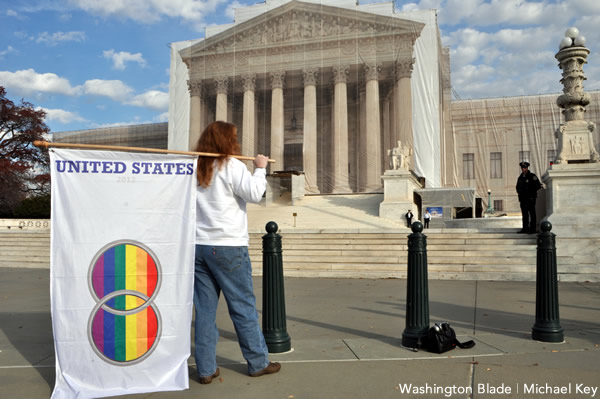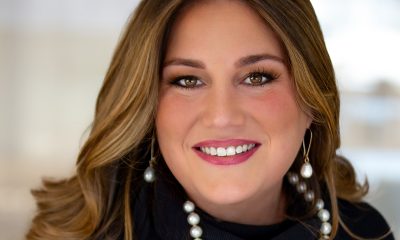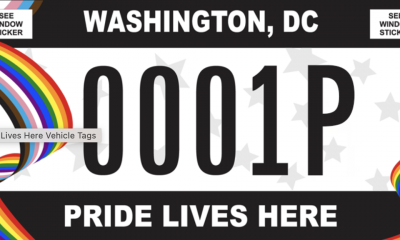National
5 questions as Supreme Court considers marriage
Justices poised to issue most significant rulings on gay rights
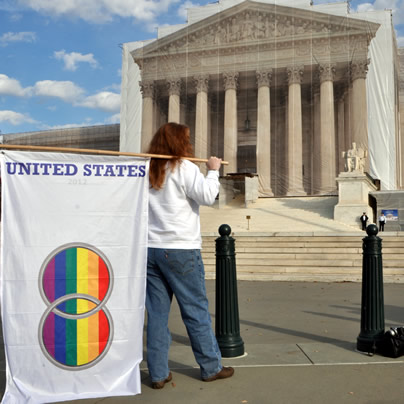
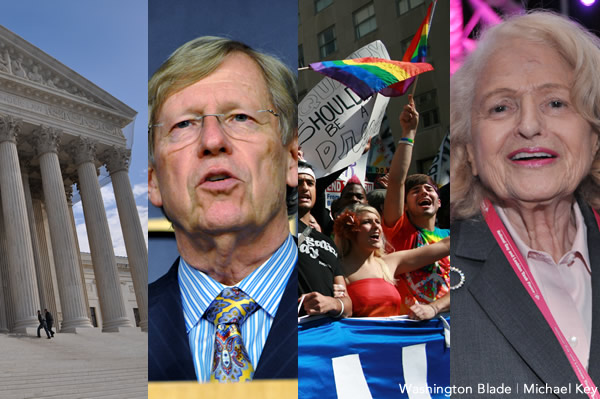
There are many legal questions to ponder as observers await the Supreme Court decision on Prop 8 and DOMA. (Washington Blade photos by Michael Key)
In the wake of last week’s announcement that the Supreme Court will hear lawsuits challenging California’s Proposition 8 and the Defense of Marriage Act, observers over the next several months will wait on pins and needles for what may be the most significant ruling on LGBT rights in history.
Here are five questions that advocates are pondering as they await decisions in Hollingsworth v. Perry, the challenge to Prop 8, and Windsor v. United States, the lawsuit against DOMA.
1. Will the Supreme Court overturn same-sex marriage bans in all states?
By taking up the Prop 8 case, as opposed to letting stand a more narrow ruling from the U.S. Ninth Circuit Court of Appeals that applied only to California, the court has an opportunity to make a ruling that not only says the same-sex marriage ban in California is unconstitutional, but marriage bans in all states throughout the country are as well.
David Boies, a co-counsel representing plaintiffs in the lawsuit on behalf of the American Foundation for Equal Rights, said during a conference call last week justices would produce a ruling that’s more expansive than California if they decide the Prop 8 case on its merits and find it violates the U.S. Constitution.
“That would mean there would be a fundamental right to marry in every state in the country because obviously the federal constitution applies to every state in the country,” Boies said.
Much in the same way that the 1967 ruling in Loving v. Virginia ended bans on interracial marriage in all states, such a sweeping decision from the Supreme Court in Prop 8 would require the 41 states that don’t have same-sex marriage on the books to allow gay couples to marry. Not only would marriage equality be restored to California, it would be extended to the estimated 646,000 same-sex couples throughout the country.
Jon Davidson, legal director at Lambda Legal, said this outcome is one of several possible ways the Supreme Court could rule if justices find a constitutional right to marry under either the due process clause or the equal protection clause.
“Either finding that we share the fundamental right or finding that it violates equal protection generally to not allow same-sex couples to marry when different-sex couples can would extend the right to marry to all 50 states,” Davidson said.
Still, the general consensus among legal experts is that the court isn’t likely to reach this outcome when it’s possible for them to reach a ruling on more narrow grounds that would just affect California or a limited number of states.
Doug NeJaime, who’s gay and a law professor at Loyola Law School, posited that since California allows domestic partnerships but not same-sex marriage, the court could produce a ruling requiring all eight states that offer either domestic partnerships or civil unions to provide full marriage rights for gay couples. Those states are California, Illinois, Rhode Island, Delaware, Hawaii, Oregon, Nevada and New Jersey.
“The middle course would be one that says states that have allowed same-sex couples to have comprehensive domestic partnerships or civil unions don’t have an adequate justification for preventing them from marrying,” NeJaime said. “That would affect more than just California, but it wouldn’t affect every state.”
2. What happens if the Supreme Court upholds both Prop 8 and DOMA?
In what he might be considered the opposite scenario compared to the situation described above, the Supreme Court could also deal a devastating blow to LGBT advocates by upholding either or both Prop 8 and DOMA.
A loss for LGBT advocates in the court in the Prop 8 case would mean they would need another voter-initiated ballot campaign to repeal the measure ballot, much like the divisive and expensive 2008 campaign that led to its passage by voters.
John O’Connor, the newly appointed executive director of Equality California, said “everything’s on the table” for discussion in the event that the Supreme Court determines the ban on same-sex marriage in California is constitutional.
“The question about would we go back to the ballot — it’s absolutely a possibility,” O’Connor said. “The timing and the tactics and all of that remain to be determined between now and the time the decision comes down but it’s absolutely a priority for us to plan that.”
Asked whether he’d rule out the possibility of going back to the ballot in 2014 at this point, O’Connor replied, “Absolutely not. I wouldn’t rule it out. That’s definitely a possibility that we’ll be considering.”
Similarly, a decision upholding DOMA would mean that Congress would have to act to repeal DOMA — mostly likely using the Respect for Marriage Act as the vehicle to undo the law. That would be a difficult task as long as Republicans remain in control of the House.
Rep. Jerrold Nadler (D-N.Y.), the chief sponsor of the Respect for Marriage Act, said in a statement he intends to work with Congress to build support for the legislation even before the court renders a decision on DOMA.
“As the Supreme Court reviews DOMA, I will continue to spearhead the participation of Members of Congress who believe that DOMA is unconstitutional in the Windsor case,” Nadler said. “At the same time, I will keep working with my colleagues to increase support for the Respect for Marriage Act, my bill to repeal DOMA and remove official discrimination from our legal code.”
3. Will the U.S. government weigh in on the Prop 8 lawsuit?
Amid news that the Supreme Court will take up the Prop 8 lawsuit, a new call has emerged for the Obama administration to weigh in on the lawsuit to assert a constitutional right for same-sex couples to marry.
Ted Olson, co-counsel for plaintiffs in the Prop 8 case, said during the conference call last week that participation from the Obama administration in the litigation would have “great effect” on the outcome of the case.
“I would hate to predict what the United States government is doing, but given the stand the president of the United States and the attorney general of the United States made with respect to marriage equality, we would certainly hope that they would participate,” Olson added.
Although President Obama asserted his personal view in May that same-sex couples should be able to marry, the Obama administration hasn’t yet answered the question of whether that’s a guaranteed right under the Constitution. The Obama administration could participate by filing a friend-of-the-court brief along with other parties, or less likely, by asking to intervene in the case.
Asked Tuesday during a White House press briefing about the Obama administration’s position on the Prop 8 case, White House Press Secretary Jay Carney declined to comment, saying, “For comment on the court’s actions on that case, I would point you to the Department of Justice. As you know the administration is not a party in that case, and I just have nothing more for you on it.”
Following the briefing, Tracy Schmaler, a Justice Department spokesperson, told the Washington Blade, “No updates at this point.”
Richard Socarides, a gay New York advocate who’s called on Obama to take an active role in supporting marriage equality, said arguing in favor of the constitutional right to marry — for all states and not just California — is “a logical extension” of the position already articulated by the administration when it determined DOMA was unconstitutional.
“If you apply that [heightened scrutiny] test that they advocate to any of the 30 states that have constitutional amendments that ban gay marriage, then all of those state amendments go out the window,” Socarides said. “So, obviously, that’s very important to us, and that’s the government position, and I think it’s important that they say so clearly rather than trying to duck it.”
Additionally, Socarides said the Obama administration won’t be able to run from the issue because justices will likely ask U.S. Solicitor General Donald Verrilli Jr. or whomever is representing the administration during oral arguments about its position on Prop 8.
“They’re kidding themselves if they don’t think some judge isn’t going to ask them,” Socarides said. “During the argument of the DOMA case, [Samuel] Alito or [Clarence] Thomas or [John] Roberts or [Antonin] Scalia is going to say to them, ‘If we apply the test you are advocating to Proposition 8, what would happen?’ They’re going to get asked this question. That’s what’s silly about this.”
Lambda’s Davidson agreed that a friend-of-the-court brief from the Obama administration would have an impact on the Supreme Court.
“They’re more likely to read a brief from the solicitor general than from other parties,” Davidson said. “And I think that they care what another branch of government says to them, so I think it will be significant. I don’t think they will decide a certain way just because the executive branch says so. They will make up their minds, but to have one branch of government telling another what they think the outcome would be, they’d pay attention to that.”
But the notion that participation from the Obama administration would be helpful to convincing justices to overturn Prop 8 isn’t universal.
Nan Hunter, a lesbian law professor at Georgetown University, said the Justice Department has articulated that laws related to sexual orientation should be subjected to heightened scrutiny and an additional brief wouldn’t have much sway.
“I don’t really think it makes much difference, frankly, to the court,” Hunter said. “The political alignment of the Obama administration is very clear on this, so I don’t really think it’ll make much difference.”
4. What happens if the Supreme Court denies standing to anti-gay forces in the lawsuit?
In addition to announcing that it would take up cases challenging Prop 8 and DOMA, the Supreme Court also called for attorneys involved in the lawsuit to answer questions about whether certain parties involved in the lawsuit have standing to present their views before the court. The standing issue will be resolved as part of the final ruling the Supreme Court makes before its term expires in June.
For the Prop 8 case, the standing question is singular: Do anti-gay groups that helped pass Prop 8 at the ballot have the right to defend the law in court because California Gov. Jerry Brown and Attorney General Kamala Harris have declined to do so? That was the opinion of the Ninth Circuit, which determined ProtectMarriage.com could defend the law after the group’s standing was certified by the California Supreme Court.
But in the DOMA case, there are issues of standing on both sides. The court asks parties to respond to whether the court has standing to hear the DOMA case because the U.S. Justice Department, the party that won the case at the district court, appealed the case as opposed to the losing side. Additionally, the court asks if the House Republican-led Bipartisan Legal Advisory Group — which took up defense of DOMA after the Obama administration announced it would no longer do so — has standing to defend the law.
The questions open up the possibility for the Supreme Court to strike down Prop 8 on technical grounds without getting into the merits of the anti-gay ban. It could assert that anti-gay groups don’t have standing to defend the law, nullifying the Ninth Circuit decision and leaving in place retired U.S. District Judge Vaughn Walker’s decision finding that same-sex couples in California have a guaranteed right to marry under the U.S. Constitution.
NeJaime said asking about the standing issue in the Prop 8 case may be an attempt for the court to open the door to striking down the same-sex marriage ban without ruling on the merits of the case.
“This court has been interested in standing for a long time,” NeJaime said. “The conservatives on the court have consistently cut back standing, so it’s not shocking to me that the court is at least interested in that standing question, and I also think it could be slightly strategic so that there is this other issue in the case that would allow the court to avoid a ruling on the merits if they decided that they don’t want to do that.”
The question of what would happen if parties lack standing in the DOMA case gets a little murkier because the issue affects both the plaintiffs (the Justice Department) and the defendants (BLAG). On Tuesday, the Supreme Court announced that it had hired Vicki Jackson, a Harvard lawyer, to argue that neither the Obama administration nor BLAG have standing to petition the court in the case.
Still, the consensus among legal experts is that justices would likely conclude both parties have standing in the DOMA case to evaluate the law on its merits, even though many raised questions about BLAG because it’s a five-member committee and not reflective of the position of Congress, or even the House, as a whole.
Hunter said precedent exists for the Supreme Court to hear a case in which the Justice Department has declined to defend a law and members of Congress have taken up defense of the statute instead.
“The reason here that I think five members of the court will reach the merits in the DOMA case is that the practical necessity for them to do so is just overwhelming,” Hunter said. “I just don’t see them allowing a federal statute to just kind of evaporate in this situation without consideration of the merits. I’m cautiously optimistic that when they do consider the merits, they will find DOMA unconstitutional, but my hunch is that the standing question is more likely to end up being important in the Prop 8 case than it will be in the DOMA case.”
5. What would happen if the Supreme Court applied heightened scrutiny to its ruling?
Another outcome in the cases that would be beneficial to the LGBT community is a determination by the Supreme Court that laws related to sexual orientation should be subjected to heightened scrutiny, or a greater assumption they’re unconstitutional.
The Supreme Court has never declared that laws related to sexual orientation should be subjected to a higher level of scrutiny as it has for race, national origin, gender and alienage even in high-profile cases such as Lawrence v. Texas, which struck down state sodomy laws throughout the country, and Romer v. Evans, which struck down Colorado’s anti-gay Amendment 2. Still, the belief that sexual orientation laws merit this level of scrutiny is the view held by the Obama administration and the U.S. Second Circuit of Appeals, the court from which the DOMA case was appealed.
Legal experts said such a ruling from the Supreme Court in which justices applied heightened scrutiny would benefit lawsuits challenging other anti-gay laws throughout the country — whether they be the Arizona law stripping away domestic partner benefits from state employees or the Tennessee law prohibiting municipalities from passing non-discrimination ordinances.
While it seems that making a decision on laws related to sexual orientation are subjected to heightened scrutiny would automatically institute the first outcome enumerated in this piece — the invalidation of all restrictions throughout the country — legal experts say that might not be the case.
NeJaime said the application of heightened scrutiny in the DOMA case would make it more likely for them to strike down Prop 8 as well, but it wouldn’t necessarily apply to same-sex marriage bans elsewhere.
“They could apply heightened scrutiny to Prop 8, which they could frame as a very specific question, and then it would take a future case to apply heightened scrutiny to some marriage ban, like a ban in Arkansas where there’s no domestic partnership,” NeJaime said.
Some observers have speculated that the Supreme Court selected the Windsor case as the vehicle to determine the constitutionality of DOMA because that’s the only case in which a federal appeals court has ruled the anti-gay law is unconstitutional by applying heightened scrutiny to the statute.
But Hunter disputed that notion and said the decision to take up Windsor is the result of U.S. Associate Justice Elena Kagan’s involvement in the other lawsuit in which an appeals court made a ruling against DOMA — the consolidated case of Gill v. Office of Personnel Management and Commonwealth of Massachusetts v. Department of Health & Human Services — when she was U.S. solicitor general and the Obama administration was still defending the law in court.
“What makes the most sense is to have all nine justices participate in that decision, and Kagan can’t participate in Gill.” Hunter said. “I think they were waiting for a second court of appeals to produce an opinion, and I think they would have taken whatever case wasn’t Gill. It was sort of anything but Gill, and that’s purely because of the Kagan recusal problem.”
National
Baldwin, Pocan named on alleged Minn. shooter’s target lists
Gunman killed state lawmaker, husband on Saturday

U.S. Sen. Tammy Baldwin and U.S. Rep. Mark Pocan, Democrats of Wisconsin, were named on lists of targets belonging to the man suspected of killing Minnesota state Rep. Melissa Hortman and her husband and of injuring Minnesota state Sen. John Hoffman and his wife.
The Hoffmans sustained multiple gunshot wounds and are reportedly in serious but stable condition.
Vance Boelter, the suspect, was apprehended on Sunday in connection with the shootings, which occurred on Saturday. He faces federal murder and stalking charges as well as state-level murder and attempted murder charges.
“Senator Baldwin was informed by law enforcement that she was included on the alleged shooter’s list of names,” Baldwin’s Communications Director Eli Rosen told Channel3000.com. “She is grateful for law enforcement’s swift action to keep the community safe and remains focused on the things that matter most here: honoring the legacy and life of Rep. Melissa Hortman and her husband, Mark, praying for the other victims who are fighting for their lives, and condemning this abhorrent, senseless political violence.”
“I recently heard that my name was in one of the Minnesota shooting suspect’s notebooks and I’m appreciative that law enforcement apprehended the suspect,” Pocan said in a statement to Channel3000.com. “I will not back down in the face of terror, however, we as elected officials, must do better to lower the temperature. That said, my schedule remains unchanged.”
The news outlet reported on Monday that Baldwin’s name appeared on a list of 70 targets, while Pocan’s name was found on additional documents. The senator and congressman are both openly LGBTQ.
Democratic U.S. Reps. Greg Landsman (Ohio), Hillary Schotlen (Mich.), Veronica Escobar (Texas), and Joaquin Castro (Texas) also confirmed that their names appeared in notebooks recovered from Boelter’s vehicle.
Other Democrats who were reportedly targeted but whose offices have not yet provided confirmation as of Tuesday afternoon include LGBTQ congresswoman Angie Craig, Minnesota Gov. Tim Walz, U.S. Sen. Tina Smith, U.S. Rep. Ilhan Omar, and Attorney General Keith Ellison, all from Minnesota, along with U.S. Sen. Tammy Duckworth of Illinois, U.S. Rep. Nikki Budzinski of Illinois, and U.S. Rep. Emanuel Cleaver of Missouri.
Walz called the shootings a “politically motivated assassination.”
Federal Government
Trump anti-trans EO used to deny health care to Democrats, unmarried vets
Veterans warn impacts will be felt disproportionately by women and LGBTQ people.

New rules would allow doctors at the U.S. Department of Veterans Affairs to deny care to unmarried veterans and Democrats at hospitals across the country, pursuant to President Donald Trump’s anti-trans executive order, “Defending Women from Gender Ideology Extremism and Restoring Biological Truth to the Federal Government.”
According to the Guardian, which was first to report the hospital guidelines on Monday, they apply also to psychologists, dentists, and other providers — allowing for individual staff to refuse care for veterans on the basis of characteristics not covered under federal law, which proscribes discrimination on the basis of race, color, religion, and sex.
Doctors can also be barred from working on VA hospitals based on their marital status, political party affiliation or union activity, per documents reviewed by the Guardian. The agency confirmed changes to the rules came in response to Trump’s executive order.
Specifically, per the paper:
Until the recent changes, VA hospitals’ bylaws said that medical staff could not discriminate against patients “on the basis of race, age, color, sex, religion, national origin, politics, marital status or disability in any employment matter”. Now, several of those items — including “national origin,” “politics” and “marital status” — have been removed from that list.
Similarly, the bylaw on “decisions regarding medical staff membership” no longer forbids VA hospitals from discriminating against candidates for staff positions based on national origin, sexual orientation, marital status, membership in a labor organization or “lawful political party affiliation.”
Experts warn that changes to the guidelines may lead to situations where, for example, doctors may question patients about whether they attended a rally for a political candidate or in support of gay rights, potentially denying care on those bases or because of the reasons given for seeking care, such as cases where the patient may report a rape or sexual assault.
Veterans warn impacts will be felt disproportionately by women and LGBTQ people.
National
New LGBTQ+ Archive to save scrubbed federal resources
Trump’s anti-DEI crusade seeks to erase entire communities
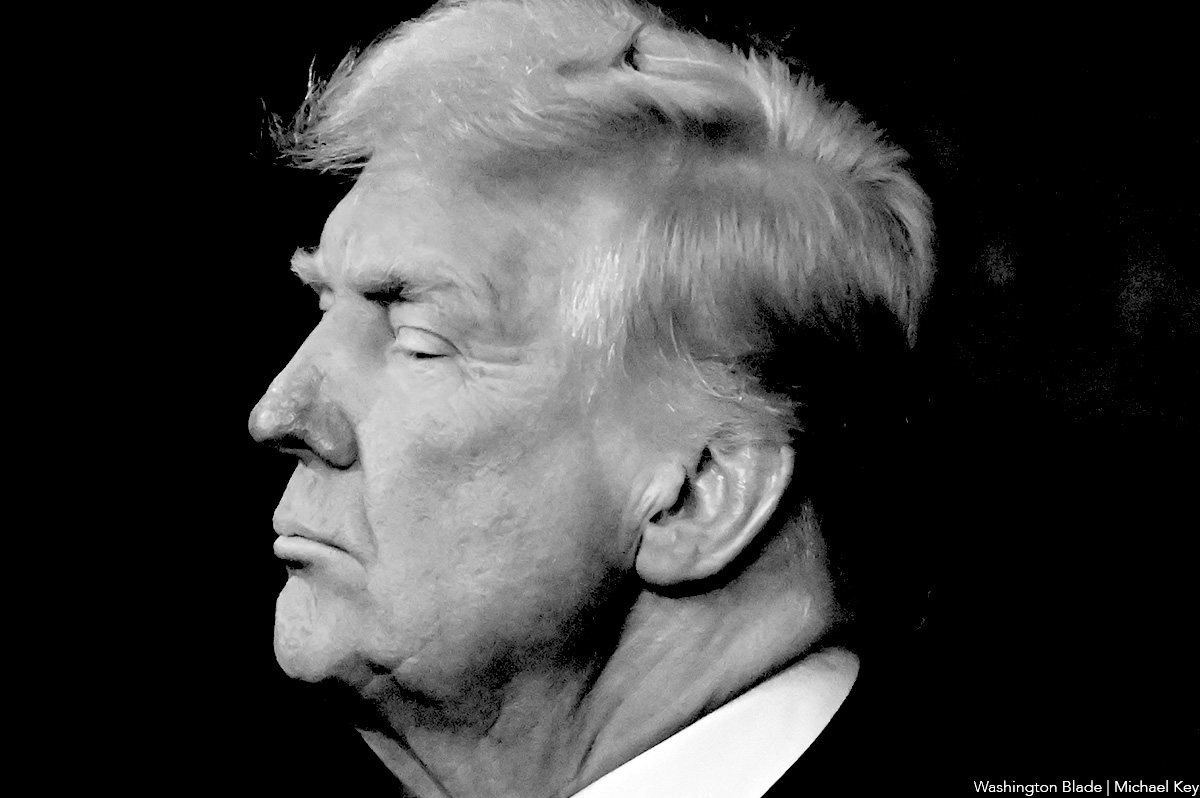
Generally, when someone says, “The internet is forever,” it is not a positive statement.
But for Shae Gardner, policy director at LGBT Tech, it has become a lifeline as she and her team have spent the last couple of months tracking down documents removed from government websites.
After a series of anti-DEI and LGBTQ executive orders, thousands of pages across the federal government have been removed or altered—with LGBTQ topics taking a big hit.
The LGBTQ+ Archive, launched by LGBT Tech last month, aims to restore lost resources about the LGBTQ community into a centralized hub. They have tracked down approximately 1,000 documents—all available as downloadable PDFs and sorted by agency—but know that more are missing. Users can submit missing documents or requests for missing documents.
Archived resources range from the 2023 Equity Action Plans mandated under Biden to HIV resource sheets.
Sid Gazula, LGBT Tech’s Google Policy Fellow said reviewing the documents scrubbed from the Department of Health and Human Services was striking. “You have these important documents related to people’s health. Health isn’t subjective,” he said, “The fact that an executive order could take away all this information was very eye-opening.”
For Gazula it made an already urgent project more urgent. “We, as a community, need access to these resources,” he said, “The archive presents a mechanism to get that access out there.”
The LGBT community has a long history of engaging in archival work, explained K.J. Rawson, professor at Northeastern University and director of the Digital Transgender Archive, in an email. He described archives as “key avenues for preserving and making accessible queer and trans history.”
Since mainstream archives often erase or misrepresent the LGBTQ community, Rawson pointed out that LGBTQ archives “fight against this trend and wrest control back into LGBTQ+ hands,” citing Cait McKinney’s phrase “information activism.”
Gardner feels appreciative of the history of LGBTQ preservation, which guided their work: “I want to make it abundantly clear that we are not the first or only organization doing this sort of preservation work.” She also mentions the Internet Archive, a non-profit library of web pages, which was invaluable during their research.
When the Blade asked about the LGBT Archive, Rawson described it as “crucial!” He elaborated that, “the overt erasure of LGBTQ+ people––but especially trans people––from federal websites has been a hostile move that’s one part of larger efforts to strip us of our humanity and our history.”
Beyond creating a record for the future, the archive is also useful in fighting for LGBTQ representation today. Gardner explained that numerous journalists and advocacy groups have already been using it. Gazula, who is a student, shared that some of their professors said it was an important resource for academic work.
To access it, users have to create an account. Gardner said this is not for marketing. Instead, they want to “put a stop gap between us and malicious actors and attacks on the site” and have a basic understanding of who is using the site. She assures users that the data is backed up on servers globally, but encourages folks to download freely from the archive.
“We decided that we wanted every document and resource on it to be a PDF that they would be able to save it themselves,” said Gardner, “This is not only meant to be very user-friendly, but is also meant to help with those resources being dispersed and being kept.”
“It is the history of our community,” Gardner continued, “we deserve to have continued access to it.”

